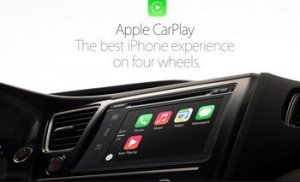 Apple Inc. has enough interest in vehicle technologies and electrification to fund an Apple-branded electric vehicle, according to sources familiar with the matter. Apple has a secret lab to test out a vehicle that looks like a minivan, sources told The Wall Street Journal. According to the article, several hundred employees are now at work on the project.
Apple Inc. has enough interest in vehicle technologies and electrification to fund an Apple-branded electric vehicle, according to sources familiar with the matter. Apple has a secret lab to test out a vehicle that looks like a minivan, sources told The Wall Street Journal. According to the article, several hundred employees are now at work on the project.
Like Google Inc.’s move into self-driving cars, the Apple test project likely has more to do with providing advanced connected car technologies in upcoming model years. Apple plunged into the automotive space nearly a year ago, unveiling CarPlay that lets drivers access contacts on their iPhones, make calls, and listen to voice mails without taking their hands off the steering wheel. Google has acknowledged that it’s seeking partnerships with automakers and tier-one suppliers and won’t be entering the business of making cars. Apple will likely do the same, with electric vehicles offering an excellent opportunity to serve a wide range of vehicle technologies. The Apple rumor is stirring up a lot of buzz in tech journals, with speculation that Apple is getting ready to take on Tesla Motors.
Chrysler has been on the sidelines with electric vehicles for several years, running a few test models in Michigan but not going much further. That is going to change, according to Al Gardner, president and CEO of the Chrysler brand within the recently named FCA. Chrysler’s new family of minivans will include a plug-in hybrid version, Gardner said. That will be part of an unveiling at next year’s Detroit Auto Show. The new minivan is another vehicle that FCA hopes can change the perception of Chrysler through the offering of sophisticated technology.
Mitsubishi will be adding to its plug-in lineup with a concept car unveiled at the Chicago Auto Show. The automaker showed off its Grand Cruiser-Plug-in Hybrid Vehicle (GC-PHEV), built on an Outlander-style SUV. It will offer a wide range of digital technologies include an “augmented reality” windshield and an all-wheel drive system. Its electric motor uses a 12 kWh lithium-ion battery. The electric drive system shares many of its components with Mitsubishi’s battery-electric vehicle, formerly known as the i-MiEV.
General Motors gained most of the media attention at the Detroit Auto Show unveiling its refreshed Chevrolet Volt – and also through surprising everyone with the announcement of its all-electric Chevrolet Bolt hatchback. Last week, GM confirmed that it will invest about $200 million in two suburban Detroit plants to build the Bolt. GM said it will spend $160 million on new tooling and equipment at its Orion assembly plant, and another $40 million for new dies at its Pontiac Metal Center plant.
The automaker had been taking a fairly conservative approach in production volumes and marketing spend on its Volt and Cadillac ELR plug-in hybrids and Chevrolet Spark battery electric car. There’s hope the Bolt might take off with its 200 mile range on a single charge and costing about $30,000 after tax credits. That could give GM a competitive advantage in going after the buyer segment Nissan is reaching with its Leaf and that Tesla Motors will be going after when it releases its more affordable Model 3 electric car in 2017. “We are putting the Bolt EV concept on the fast track to production, because reaction to the concept was overwhelmingly positive,” Alan Batey, president of GM North America, said in a written statement. “It has the potential to quickly shake up the status quo for electric vehicles. It’s an EV aimed at everyday drivers.”



